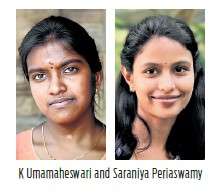Indian women scientists propel space innovation with world's first 3D-printed rocket engine

Two Indian female scientists made significant impacts in aerospace innovation, playing pivotal roles in the successful test launch of the world's first flight powered by a single-piece 3D-printed rocket engine.
K Umamaheswari and Saraniya Periaswamy, integral members of the Indian space startup Agnikul Cosmos, indigenously designed rocket that was successfully test-launched on May 30.
Umamaheswari, a graduate of aeronautical engineering from the Madras Institute of Technology, Anna University, in eastern India served as the project director. Her responsibilities included the entire development process, from the initial design to the final integration with the launch pad.
“My role was to build the vehicle from design to manufacturing and to integrate it with the launch pad,” Umamaheswari said.
Saraniya Periaswamy, also with a background in aeronautics, led the team responsible for developing the 3D-printed engine and the launch vehicle as the vehicle director.
Reflecting on her career choice, Saraniya shared, “Since my background was in aeronautics, I wanted to work with an institution which has to do with aerospace. And from my college days, I was keen on hardware.”
Following the triumph of Mission 01 of Agnibaan SOrTeD, Umamaheswari and Saraniya disclosed that Agnikul Cosmos is now focusing on other ambitious endeavours, including an orbital mission slated for 2025.
They emphasised that the single-piece 3D-printed engine significantly reduces manufacturing time by minimising the number of components and interfaces.
Saraniya also shared that there are other components aside from the engine which are 3D printed. “Apart from the engine, we have other components which are 3D printed,” she said.
Women have long been crucial to the advancement of India's space sector. The Chandrayaan-3 project, which made India the first nation to successfully land on the moon’s south pole, had around 27% of its senior executive positions held by women. This follows the legacy of previous missions like the Mars Orbiter Mission a decade ago, where women scientists such as Ritu Karidhal, the Deputy Operations Director, played key roles.